Europe’s Far Right Finds A Friend In Putin
The European far right has found a friend in an unlikely place.
The New York Times’ Andrew Higgins notes that far-right groups throughout Europe seem to be flocking to Vladimir Putin’s banner, at least rhetorically:
LE CHESNAY, France — At a rally last week near the Palace of Versailles, France’s largest far-right party, the National Front, deployed all the familiar theatrics and populist themes of nationalist movements across Europe.
A standing-room-only crowd waved the national flag, joined in a boisterous singing of the national anthem and applauded as speakers denounced freeloading foreigners and, with particular venom, the European Union.
But the event, part of an energetic push for votes by France’s surging far right ahead of elections this week for the European Parliament, also promoted an agenda distant from the customary concerns of conservative voters: why Europe needs to break its “submission” to the United States and look to Russia as a force for peace and a bulwark against moral decay.
While the European Union has joined Washington in denouncing Russia’s annexation of Crimea and the chaos stirred by pro-Russian separatists in eastern Ukraine, Europe’s right-wing populists have been gripped by a contrarian fever of enthusiasm for Russia and its president, Vladimir V. Putin.
“Russian influence in the affairs of the far right is a phenomenon seen all over Europe,” said a study by the Political Capital Institute, a Hungarian research group. It predicted that far-right parties, “spearheaded by the French National Front,” could form a pro-Russian bloc in the European Parliament or, at the very least, amplify previously marginal pro-Russian voices.
Pro-Russian sentiment remains largely confined to the fringes of European politics, though Mr. Putin also has more mainstream admirers and allies on both the right and the left, including Silvio Berlusconi, the former Italian prime minister, and Gerhard Schröder, the former German chancellor. Mr. Putin’s authoritarian leanings and pugnacious nationalism have generated widespread and diverse opposition to him across Europe; at a gay pride event in Brussels on Saturday, marchers wore masks featuring Mr. Putin’s face, colored pink and daubed with blue eye shadow and red lipstick.
Even among far-right groups, the sympathy for Russia and suspicion of Washington are in part tactical: Focused on clawing back power from the European Union’s bureaucracy, they seize any cause that puts them at odds with policy makers in Brussels and the conventional wisdom of European elites.
But they also reflect a general crumbling of public trust in the beliefs and institutions that have dominated Europe since the end of World War II, including the Continent’s relationship with the United States.
“Europe is a big sick body,” said Alain de Benoist, a French philosopher and a leading figure in a French school of political thought known as the “new right.” Mr. de Benoist said Russia “is now obviously the principal alternative to American hegemony.” Mr. Putin, he added, is perhaps “not the savior of humanity,” but “there are many good reasons to be pro-Russian.”
I’ve noted in the past the prevalence of some American conservatives to say positives things about Vladimir Putin and Russia — see here, here, and here, for example. In many cases, these positive comments about Putin are obviously motivated primarily by a desire to undermine President Obama by comparing him negatively to Russia’s President, who has manufactured an image for himself as an assertive leader. In other cases, though, the praise seems to be motivated by genuine support for Putin’s attempts to portray himself as a protector of Christians, both in Russian and in places such as Syria, and recent Russian legislative moves that have enacted anti-gay policies such as those that drew criticism prior to the Sochi Olympics. And, indeed, that’s a large part of what seems to attract the European far-right as well, although much of their expressed support for Putin seems to be rooted in opposition to the European Union:
Luc Michel, the Belgian head of the Eurasian Observatory, which receives some financial support from Russian companies but promotes itself as independent and apolitical, champions the establishment of a new “Eurasian” alliance, stretching from Vladivostok in Russia to Lisbon in Portugal and purged of American influence. The National Front, preoccupied with recovering sovereign powers surrendered to Brussels, has shown little enthusiasm for a new Eurasian bloc. But it, too, bristles at Europe’s failure to project itself as a global player independent from America, and looks to Russia for help.
The European Union, said Marion Maréchal-Le Pen, a member of the French Parliament and a niece of Marine Le Pen, is “the poodle of the United States.”
Russia offers the prospect of a new European order free of what Mr. Chauprade, in his own speech, described as its servitude to a “technocratic elite serving the American and European financial oligarchy” and its “enslavement by consumerist urges and sexual impulses.”
It’s worth noting, of course, that for the most part the far right in Europe remains a sometimes loud, but generally politically powerless entity. With limited exceptions where they have been very junior members of a coalition government, these far right parties have remained on the fringe of politics in pretty much every nation where they have arisen. There’s no guarantee that this will continue forever, however, and there have certainly been signs in nations ranging from France to Denmark to the United Kingdom, where the UKIP seems to be making a bid to contest the elections coming up in 2015, that the anti-European far right has gained greatly from the state of economy in the years since the Great Recession. This has certainly been the case in the nation’s most affected by the Eurozone crisis, such as Greece and certain parts of Eastern Europe. These parties have also profited from the influx of Muslim and other immigrants into Europe, and the changes to the cultures of those nations have taken place because of that. The possibility that this could translate into greater success certainly exists. After all, Europe has a long history of lurching into fascism in times of crisis.
How the European far right’s apparent newly found love for all things Putin is unclear. However, we’ve already seen the difficulties the United States has faced in creating a united front with its European allies when it comes to sanctions against Russia over its actions in Ukraine. If groups like this start to become a louder voice in European politics, then creating that united front in other situations could become even more difficult.
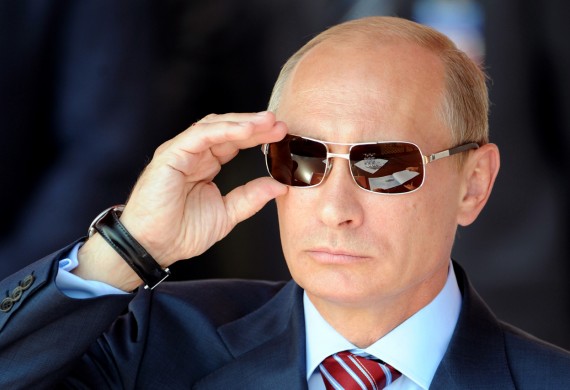

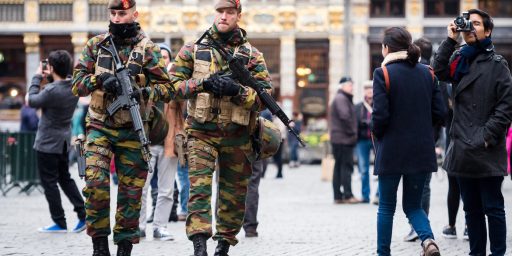

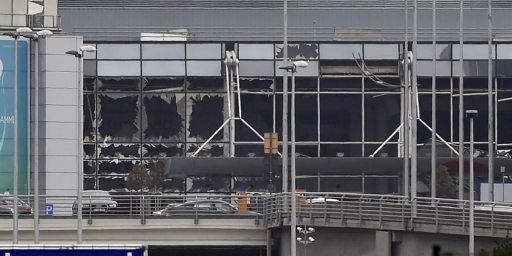
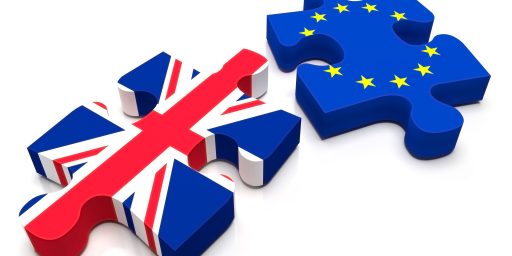
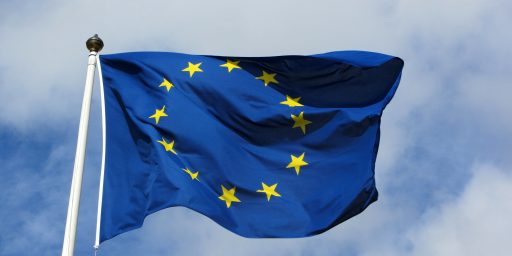
This is the equivalent of leftists idolizing Stalin during the 30s. Root cause is a deep dissatisfaction with the way the country is going. Leftists were considered traitors in the 30s. Should our rightists be considered the same today?
You’re just replacing one hegemon with another, idiot.
Instead of turning to Russia, why don’t you press for political union in the EU? Go for something like a United States of Europe? Doesn’t the EU all combined have the biggest global economy? Oh, but you can’t go for a political union because the last thousand years of history shows our civil war and the lingering resentment from it is a walk in the park compared to the cultural enmity that exists between you people.
This is one of those instances when our cultural diversity shines as a real strength.
Putin’s message is perfectly fitted to the European far right. It’s nationalistic and anti-Muslim. The pro-Russian population in Ukraine uses a nationalistic message against the perceived pro-Western current government. (Paradoxically, they use that message to undermine their own nation, but then again, the definition of “nation” can be tricky.) You can’t apply an American left-versus-right framework to Europe. In the European context, an alliance between the far right and Putin makes sense.
The great strength of the French Front National and UKIP is not the economy, it´s opposition to Brussels. It´s the unellected bureaucrats that fuels these parties, not the recession. Basically, Nigel Farage, Marine Le Pen, Jussi Niinistö, etc are only talking about the EU.
This poster says it all:
http://www.independent.co.uk/incoming/article9413423.ece/alternates/w460/web-ukip-gettyv2.jpg
What Andre said.
This is merely an “alliance” of mutual interests in bigotry, nationalism and promoting the christian faith again. What they want to do is undermine Brussels and what they consider a far “left” agenda of consumerism and sexuality.
@Dave D: Watch BBC´s Question Time(Someone uploads it in Youtube). In EVERY show there is someone in the audience complaining about the EU.
@Andre Kenji: You can sense how fed up a majority of EU countries are with the EU based solely on their reporting of events and or editorials. Especially the PIIGS countries when told to get their financial houses in order and open their books to the IMF when austerity was imposed. Then you have countries like Germany and France who hate having to pay for other countries. All of this has been fomenting since the new constitution was adopted. The EU is a boogeyman used to engender nationalism, exceptionalism and bigotry. It is basically what the far right does in the US whenever anyone mentions the UN. Except the EU actually has some bit of authority.
Anyone who had spent more than 5 minutes in Moscow would find the idea that Russia is somehow rejecting consumerism and hyper-sexuality beyond deranged (seriously, riding the subway in the Summer in Moscow is basically the equivalent of going clubbing in any other city as far as brands and naked skin are concerned..)
The American Right loves Putin too.
So much so that they were willing to deny Obama his request for congressional approval for authority to take action in Syria, and in so doing they ceded power brokering authority in this situation to Putin.
Hmm, that sounds like a lot of people on the right in this country, including several who post comments on this blog…
The American right is a completely different thing from the European right, which is so many different, contradictory things that it can’t be called a “thing”. Not that there aren’t different strains in the American right either. But there is no broad love for Putin among the American right.
@Pinky:
The enemy of my enemy is my friend, is more like it.
Although I always found that to be ridiculous and dangerous. The enemy of my enemy is just that…my enemy’s enemy. Nothing more, nothing less.
@CB: That’s just not the case here.
Oh really? Perhaps not broad, but certainly love…
@An Interested Party: Inasmuch as they can contrast Putin’s supposed virtues against Obama’s vices, yes, they like him. They’re not pro-Putin so much as they are anti-Obama. It’s a distinction worth keeping in mind.
@Dave D:
1-) Ironically, there are basically no parties in Greece, Portugal, etc demanding that these countries exit the EU.
2-) The matter with the EU in the United Kingdom and France is not money, but control. Marine Le Pen and even Farage are always talking about autonomy and control, not money.
3-) Ironically, there is no equivalent to Nigel Farage or Marine Le Pen in Germany.
@Scott:
That all depends upon what they do.
@Pinky:
No, I agree that there is no true love for Putin on the right. It’s a superficial marriage of convenience, if anything. I might be coming in late and missing your point though.
@Pinky:
Just curious, do you think there was “broad love” for Stalin among the American left?
@Matt Bernius: I wasn’t around then. I wasn’t a well-informed leftist in the 1930’s. As I understand it, there was a significant wing of hard leftists who were in love with Stalin, because he appeared to be implementing their favored policies. If I wanted to know more, I would have asked a member of the left. I wouldn’t have read the right-wing equivalent of Salon in order to find out the thinking of the left wing.
@Andre Kenji:
Golden Dawn?
@Pinky:
Given the support that conservative writers have given to Putin’s social policies (see Rod Dreher’s writings on Putin’s commitment to returning the Russian Orthodox Church to social Prominence) and the amount of comments Fox News and Right Wing Radio pundits made about Putin’s emasculation of Obama (down to the repeated meme that Putin is “more of a man than Obama”), I find it somewhat disingenuous to argue that important portions of the American Right “Intelligentsia” don’t have (at least) a somewhat positive of Mr Putin.
BTW, to see all of this in action, I don’t need to go to the “Salon” of the American Left. I can go to Fox News, listen to right wing radio, and visit places like the National Review and Red State — unless of course, you want to argue that these are not good representatives of public opinion on the right.
@Matt Bernius: Two separate things:
Rod Dreher and the American Conservative represent a small faction of the right. The fact that it’s isolationist attracts some attention from libertarians and liberals who find themselves surprised to agree with people on the traditional right. But it’s no bellwether.
Aside from them, I’m not hearing any pro-Putin talk from the right. Plenty of criticism of the President, but no more fraternal feeling for Putin than the left had for Hurricane Katrina.
One more thing, I guess: I should point out why Putin is unpopular on the right. But do I have to? He’s an oppressive former KGB man who aids our enemies and attacks our friends.
@Pinky:
Ummm I have a hard time reconciling that with the number of times they ran a picture of a topless Putin riding a horse and waxed about “how manly he looked.”
And what about Victor Dean Hanson’s celebration of Putin’s decisiveness at the National Review:
Sure he say’s that Putin is “wrong”, but how do you reconcile Hanson’s praise of Putin’s confidence? Or Hannity, Limbaugh, and other’s praise of his “manliness” (not to mention Putin’s hard anti-LGBT positions)?
Or is just a homoerotic party on the right?
@Matt Bernius: Did you read the whole Hanson piece? For that matter, what in the quote you supplied constitutes praise?
@Pinky:
Yes I did read that piece and VDH’s other writings on Putin.
As far as “praise” seriously, let’s start with:
Which then leads into multuple paragraphs that *praise* including Putin’s suppression of LGBT rights and sending Pussy Riot to jail.
VDH again:
Later:
It’s pretty clear which path dark and forceful or liberal and considered VDH prefers.
VDH clearly seems to prefer the active Satan over the “good man” whos hands are tied by Liberalism.
Seriously, the entire piece (like most of VDH’s writings are Putin Haliographies). And the tone is reflected in most of the ways that Putin is represented in Conservative Media — of course “he’s the enemy… but he’s the enemy that we want to be like.” OR are you telling me you don’t see even the hints of admiration in this writing? A call to “be more like Putin?”
Pretending that undercurrent isn’t there is rediculous.
[Source of quotes: http://www.nationalreview.com/article/370782/value-putin-victor-davis-hanson ]
@Matt Bernius: We disagree. I don’t think you’re giving that piece a fair reading.
@Pinky:
That’s entirely possible (especially given the very different ways you and I have read things in the past).
I’m just curious, can you sum up your reading of the piece?
@Matt Bernius: I can’t sum up the piece better than Hanson did: “what Is Putin? He is a constant reminder to the postmodern Western mind that the human condition has not yet evolved beyond the fist.”
That’s not praise. Hanson is a historian, more interested in fact than opinion. He’s not seeking to reimagine the world, but to understand it. Look at the words he uses: “evil”, “savage”, “thuggish”. Hanson isn’t spinning Putin into a hero, even a misguided hero. Hanson denounces “the strange Pat Buchanan–style admiration for Putin’s creepy reactionary social agenda and his tirades about Western social decadence”, making this an odd article for you to cite as proof of a love affair.
I remember someone once suggested that Hitler should be given an honorary degree in theology, because he took a world that had lost its belief and showed it that evil is real. Hanson sees Putin in the same way. He exposes the Western weakness for believing that nineteenth century-militarism is necessarily a thing of the past. Again, a quote: “You see, Putin is the dark side come alive without apology in a self-congratulatory age when he supposedly should not exist. That his economy is unsustainable, that his corruption ruined the promise of a new Russia, that his oppression is nihilistic, that we are mostly right, he usually wrong, bothers him not at all.” How could you read that as praise? To a historian, it is important that we learn from the past. To a military historian, it is important that we remember that he who applies the most effective force usually determines the fate of those around him.
@Pinky:
First, thanks for the thoughtful response.
I agree that Hansen wrote that, but again, in my reading of the article, he then presents his own creepy admiration of Putin (i.e. comparing him to Milton’s Lucifer).
And again, I ask how do you read the following paragraph other than to say that “we need to be more like Putin?:
Hansen, across all of his writing, makes it clear he thinks we are either at or just about to reach that “dark future” (hence the implicit value judgement of “dark”). He positions Putin as immune to this path — and to all of the excesses of Liberalism that Hansen details on the first page.
Do you think that it’s a credible interpretation of Hansen’s writing that he see’s Putin’s approach to dealing with the excesses of Liberalism better than our culture’s current approach? If not, can you please point out the part of the essay where Hansen specifically decries Putin’s strong man approach?
@Matt Bernius: I don’t think that’s a credible reading at all. I already provided quotes on that point: “evil”, “savage”, “thuggish”, “creepy reactionary social agenda”, et cetera. Hanson’s image of a dark future is one where the “mostly right” West loses confidence in what’s right and loses the determination to defend what’s right. Hamlet was a good guy, and his uncle was a bad guy, but Hamlet’s uncle had the determination that Hamlet lacked. But Shakespeare is in no way praising the uncle. Hanson doesn’t fear that the West is wrong; he fears that it will forget it’s right.
@Pinky:
I think you’ve raised some good points. I don’t agree, but I have a better understanding of where your interpretation is coming from.
—-
To make my final point, and why I continue to assert my reading is definitely defensible, I think you are completely skipping over the implied value judgements within all the binary comparisons Hansen makes on the first page, see below. Your right, he keeps saying that “Putin is the devil”, but it sure seems like he likes a lot of the devil’s approach.
Yes or no — in Hansen’s view who is the winner in each of these confrontations?
And the Miley Ray Cyrus and the ecological stuff (life saving water) clearly demonstrate that Hansen’s personal feelings seem to be much closer to Putin’s than our culture’s reaction to them.
To your Shakespearian point, the script never does anything to present Claudius in such a celebratory light. It’s completely possible to stage the play that way, but doing so requires a specific decision to create empathy for Claudius (and position him against Hamlet). But a cold reading of the play doesn’t initially suggest that sympathy.
Try as I might, I cannot do a cold reading of this that doesn’t contain some degree of praise for Putin.
Let’s not forget Sarah Palin’s near-orgasmic gushing about Putin’s virtues. By any standard, Palin is a leading figure on the right.
Hell, that makes it even worse…they hate the President so much that they have to praise an ex-KGB thug…
No need to even read Salon…just going to the links posted on the Salon website showcases the love that certain conservatives have for Putin…
@anjin-san:
On Anjin, I call. Got a link to that praise?
@ Matt
Lots of Palin on Putin in here:
http://www.realclearpolitics.com/video/2014/03/03/sarah_palin_putin_wrestles_bears_obama_wears_mom_jeans_and_bloviates.html
Raises two questions
1. Has no one told Palin that we are in the middle of a historic energy boom
2. How much botox does this woman use?
@anjin-san:
I see little difference between what Palin said there and what VDH and others have said elsewhere. Take the following quote:
Again, I read that the same way you do. And I suspect that Pinky would say nothing in here resembles a compliment.
This is going to be one of those topics where no common ground is going to be found.
@ Matt Bernius
Palin also made a reference of some sort to Obama’s lack of “potency” – interesting that she would frame it that way.
@anjin-san:
Well, she can see Putin from her back yard and he gets her hot.